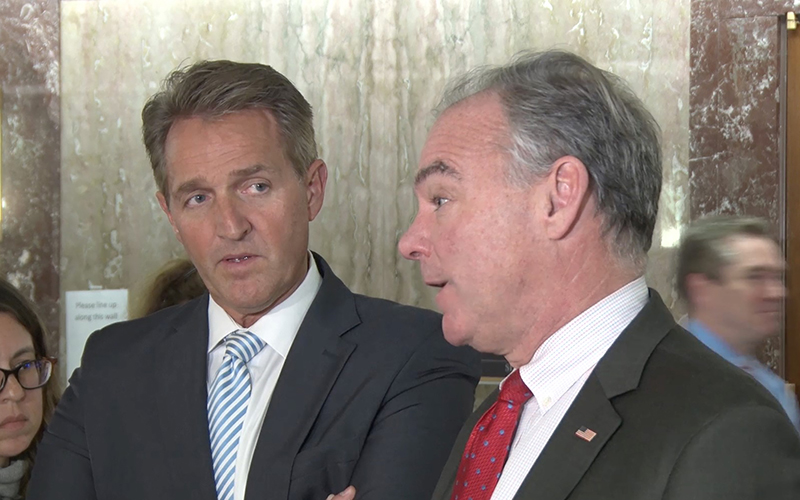
Sen. Jeff Flake, R-Arizona, and Sen. Tim Kaine, D-Virginia, are co-sponsors of a proposal that would give Congress a chance to vote on the use of the military in the war on terror – something last approved 16 years ago. (Photo by Fraser Allan Best/Cronkite News)
WASHINGTON – When Congress first authorized military action against terrorists in 2001 in the wake of the 9/11 attacks, Jeff Flake was a freshman member of the House and Tim Kaine was still mayor of Richmond, Virginia.
Today, both men are U.S. senators and the county is still waging war under the 2001 Authorization for Use of Military Force, or AUMF – a vote they say it’s time to revisit.
“Not one senator on that panel was here in 2001 to vote on that original AUMF, not one,” Flake said Monday outside a hearing of the Foreign Relations Committee. “Only 23 members of the Senate, as it currently is, voted on the 2001 AUMF.”
Flake, an Arizona Republican, and Kaine, a Virginia Democrat, renewed their call Monday for a new AUMF that would allow the military to wage war against “non-state” actors like ISIS, the Taliban, al Qaeda and their affiliates while giving Congress greater oversight over the process. And, just as importantly to Flake, it would force current members of Congress, many of whom did not vote in 2001, to weigh in on the issue.
Their comments followed a Foreign Relations Committee hearing in which two Trump Cabinet secretaries said a new AUMF is not needed.
While they are willing to negotiate some new provisions, Defense Secretary James Mattis and Secretary of State Rex Tillerson pushed back against a new AUMF, with Mattis telling the committee the “2001 and 2002 AUMFs should not be repealed.”
“The uncertainty accompanying that situation could only signal to our enemies and our friends that we are backing away from this fight,” Mattis said.
Tillerson said he has concerns about the five-year time limit in the Flake-Kaine measure.
“New authorizations should not be time-constrained,” Tillerson said, adding that it “could unintentionally embolden our enemies with the goal of outlasting us.”
The Flake-Kaine resolution was not the subject of Monday’s hearing, but both senators said it is needed.
The AUMF approved in the wake of the 9/11 attacks gives the president power to pursue terrorists who conspired in the attacks, like al Qaeda and its affiliates, without seeking additional congressional approval.
Both Kaine and Flake said the war against terror must still be waged, and their measure would not reverse that. But Kaine said that since the 2001 authorization was approved, the global context has changed. He said military involvement in the fight against terror can no longer be viewed as a short-term response to 9/11.
“The status quo today is these witnesses believe this war will go on for a very long time,” Kaine said.
-Cronkite News video by Fraser Allan Best
But the Constitution requires that such a long-term conflict needs greater congressional involvement, he said, and less of a blank check for the president.
“The concept of a generations-long war potentially without Congress weighing in is just untenable given the constitutional framework we have,” Kaine said.
The senators’ proposal would allow action against Isis, Al Qaeda, the Taliban, and other non-state forces that Congress rules to be “associated forces” to terror groups. But it also requires renewal of any such authorization every five years.
In response to Mattis and Tillerson, Kaine said the proposal’s “five-year sunset is not an arbitrary termination of U.S. military action.”
“They testified today that they wouldn’t like operational restrictions, and there are no operational restrictions in our authorization,” he said.
Their measure has yet to get a hearing, but Flake said he remains confident it will move forward, despite pushback from the administration.
“Like I said, an administration will always take whatever authority you give them,” he said. “We’ve got the commitment of the chairmen to move ahead.”